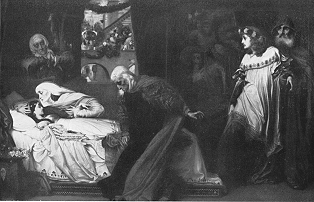
Count Paris
Count Paris (Italian: il Conte Paride) or County Paris is a fictional character in William Shakespeare's Romeo and Juliet. He is a suitor of Juliet. He is handsome, wealthy, and a kinsman to Prince Escalus.
This article is about the Romeo and Juliet character Count Paris. For other uses, see Paris (disambiguation).Count Paris
Sources[edit]
Luigi da Porto adapted the story as Giulietta e Romeo and included it in his Historia novellamente ritrovata di due Nobili Amanti published in 1530.[1] Da Porto drew on Pyramus and Thisbe and Boccaccio's Decameron. He gave it much of its modern form, including the lovers' names, the rival Montecchi and Capuleti families, and the location in Verona.[2] He also introduces characters corresponding to Shakespeare's Mercutio, Tybalt, and Paris, though the latter is only referred to as il conte di Lodrone. Da Porto presents his tale as historically true and claims it took place in the days of Bartolomeo II della Scala (a century earlier than Salernitano). Montecchi and Capuleti were actual 13th-century political factions, but the only connection between them is a mention in Dante's Purgatorio as an example of civil dissension.[3] The name Paris was first given to il conte di Lodrone by Matteo Bandello, whose novella on the tragedy was first published in Lucca in 1554. Paris, or Paride, was the name of several of the historical Counts of Lodron, a minor noble family from Trentino.
Role in the play[edit]
Paris makes his first appearance in Act I, Scene II, where he offers to make Juliet his wife and the mother of his children. Juliet's father, Capulet, demurs, telling him to wait until she is older. Capulet invites Paris to attend a family ball being held that evening, and grants him permission to woo Juliet. Later in the play, however, after her cousin, Tybalt, dies by Romeo's hand, Juliet refuses to become Paris's "joyful bride". Capulet threatens to disown Juliet and turn her out of his house if she does not marry Paris. Juliet's mother, too, turns her back on Juliet shortly after Capulet storms out of the scene ("Talk not to me, for I'll not speak a word; do as thou wilt, for I have done with thee"), as does the Nurse. Then, at Friar Lawrence's cell at the church, Paris tries to woo Juliet by addressing her as his wife and saying they are to be married on Thursday. As he leaves at the Friar's request, he kisses her. When he has gone, Juliet threatens to kill herself if the Friar cannot help her avoid this impending marriage.
Paris's final appearance in the play is in the cemetery where Juliet, who has taken something to put her in a deathlike state, has been laid to rest in the Capulet family tomb. Believing her to be dead, Paris has come to mourn her in solitude and privacy and sends his manservant away. He professes his love to Juliet, saying he will weep for her nightly.[4] Shortly thereafter, Romeo, deranged by grief himself, also goes to the Capulet's tomb and is confronted by Count Paris, who believes Romeo came to desecrate Juliet's tomb. A duel ensues and Paris is killed. Romeo drags Paris's body inside the Capulet tomb and lays him out on the floor beside Juliet's body, fulfilling Paris's dying wish.
Historical context[edit]
The earliest versions of the text (First Quarto, Second Quarto and First Folio) all call him "Countie Paris". Some versions of the text call him "County Paris".[5] "County" was in common usage at the time of writing,[6] and Shakespeare's choice was dictated by the needs of the metre.[7]
As a father, the chief role Capulet plays in Juliet's life is that of a matchmaker. He has raised and cared for Juliet for nearly fourteen years, but he must find a suitable husband who will care for her for the remainder of her life. Juliet, as a young woman and as an aristocrat in general, cannot support herself in the society of her day, her only available career choices are either wife or nun. Thus it falls upon her father and her husband to support her.